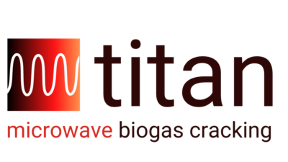COLLABORATIONS
Throughout its life, STORMING will seek to find common synergies and objectives with other EU projects, to increase its reach to as many interested parties as possible, starting off with two sister projects:

Direct biogas conversion to green H2 and carbon materials by scalable microwave heaTed catalytIc reacTor for soil Amendment and silicon carbide production
TITAN project will develop an innovative process that will enable production of cost-competitive hydrogen together with integrated carbon sequestration. It will be achieved by the direct conversion of biogas (CO2containing methane-rich feedstock) into hydrogen and valuable carbon materials. The project will also consider further valorisation to power, chemicals and fuels.
Coldspark driven energy and cost-efficient methane cracking for hydrogen production
The project plans to develop innovative technology for eliminating CO2 emissions stemming from conventional hydrogen production. The novel solution is to produce sustainable hydrogen from methane or biomethane, on the grounds that the use of cold plasma would yield an energy conversion rate of 85 % with zero CO2emissions.


e-CODUCT tackles the environmental challenge of reducing greenhouse gas and acid gases
Building on successful projects and an interdisciplinary approach, e-CODUCT applies to develop a working pilot plant for an electrothermal catalytic reactor powered by renewable energy sources to produce industrially valuable carbon monoxide (CO) and sulphur (S) from carbon dioxide (CO₂) and hydrogen sulphide (H₂S) and to further apply the process in fluid catalytic cracking, steam cracking and dehydrogenation.
EReTech will develop and validate a transformative electrically heated reactor together with the tailored catalyst for steam methane reforming
Based on SYPOX technology the reactor hosts ceramic supported structured catalyst, electrically heated by internal direct resistive heating elements. This achieves an energy efficiency close to 95% and a reactor volume that is two orders-of-magnitude smaller.
EReTech final goal is to offer solutions for the decentralized market and for the decarbonization of existing or new centralized reforming plants.


ēQATOR proposes a paradigm change to the heating of catalytic reactions, by using electricity generated from renewable energy rather than fossil fuels.
Through its lower energy intensity and processing footprint, the ēQATOR technology will achieve a cost-competitive renewable methanol production with near zero CO emissions, accelerating the transition to the next generation of intensified catalytic processes for the EU industry and beyond.
The KNOWSKITE-X project is a vital step towards the European Union’s energy strategy, and its innovative methodologies could revolutionize the development of sustainable technologies.
The project will demonstrate a science-based approach to the development of electrode materials forming key parts of reversible chemical-to-power cells. Such devices operate in two modes: in fuel cell (FC) mode, it converts hydrogen into electricity whereas when operating as electrolyser cell (EC), it uses excess electricity to form hydrogen from water electrolysis. This versatility enables the integration of intermittent renewable energy sources with the electrical grid by storing the excess energy as carbon-free chemical fuel. In particular, the project targets mixed oxides with perovskite structure with minimised critical content while keeping highest possible performances and targeting fair economic viability.

